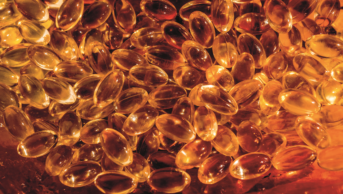
Shutterstock.com
The population of the UK should consider taking a daily vitamin D supplement during the autumn and winter months, Public Health England (PHE) has advised.
Vitamin D, equivalent to an average daily intake of 10μg, is needed to protect muscle and bone health, says PHE. Most people will get enough vitamin D through exposure to sunlight during the summer months but, because it is hard to quantify the amount produced in the skin, a dietary intake of 10μg is also recommended.
“Everyone will need to consider taking a supplement in the autumn and winter if they don’t eat enough foods that naturally contain vitamin D or are fortified with it,” says Louis Levy, head of nutrition science at PHE.
The advice is based on the findings of an evidence review by the Scientific Advisory Committee on Nutrition (SACN), which advises the government on matters relating to diet, nutrition and health.
Previously, vitamin D supplements were only recommended for at-risk groups, such as people aged over 65 years, pregnant or breastfeeding women, and children aged six months to five years. This has now been extended to children from birth, who the SACN suggests should consume 8.5μg to 10μg of vitamin D per day.
People most at risk of vitamin D deficiency should consider taking a supplement all year around. This includes people with darker skin and people who don’t go outside (such as people in care homes) or who always cover their skin when they are outside.
Gul Root, lead public health pharmacist at PHE, says: “Pharmacy teams play a vital role in raising awareness of the importance of vitamin D among customers, especially at-risk groups, and in providing affordable daily 10μg supplements.”
Vitamin D supplements are available free for families on low incomes through the Healthy Start programme.
The vitamin is found in a small number of foods, such as oily fish, red meat, liver and egg yolks and in fortified food like breakfast cereals and fat spreads.
In the UK, more than 20% of the adult population has low vitamin D levels in their blood. If low levels turn into a deficiency it can lead to rickets in children or osteomalacia in adults, which causes soft bones.


